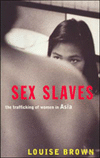
Selling Sex in Siam
Even paradise has its seedy side, a fact that comes through clearly in Louise Brown's important book, Sex Slaves: The Trafficking of Women in Asia (Virago, 2000). Examining the region's sex trade and shedding light on its abuses and exploitations, Brown's book is a wake-up call and a condemnation. But mostly it is a chronicle of commodification, filled with very sad stories about the lives of innocent girls and women forced to sell their bodies as if they were just so much meat.

.gif)
